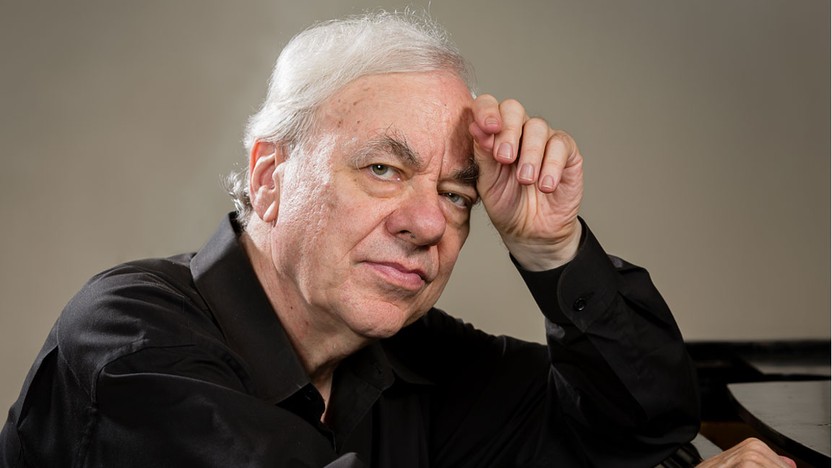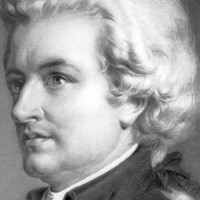Richard Goode Plays Mozart’s Piano Concertos Nos. 18 and 23



Līlā (pronounced as “Lee-Luh”) is a Sanskrit word that can mean any form of performing arts (play, dance, etc.) by gods (though anything can be a god in Hinduism). This piece, Līlā, draws inspiration from the Korean shamanistic ritual called gut. A gut serves various functions: to comfort the dead and send them to where they belong, to heal the unwell by expelling the devil, and to bless a community, such as a family, company, or town. A gut session would be hours long, containing as many as two dozen sections.
While rhythm is the driving force in many sections, as with shamanistic rituals in other cultures, the gut is distinct for its melodic system (called tori), which has become the basis of many different Korean folk music genres, including pansori (epic saga) and sanjo (virtuosic instrumental solo music). The melody in the gut is sung by the shaman and performed by a string or reed player. In this melodic system, specific notes are elaborated by descending glissando and some others by wide vibrato.
There are a handful of basic rhythmic patterns called jangdan (meaning long and short) and their countless variations. Those basic jangdans differ from one another concerning tempo and meter. However, most of them are related to each other by augmentation/diminution, allowing the entirety to be cohesive. This is one of the concepts I applied to my piece, though the principal rhythmic pattern in my work (a seven-beat pattern) is not from the gut tradition. Similarly, no specific gut melody is quoted in Līlā, although the pitch contents reflect the melodic system and speech patterns.
The gut differs from other related traditions (like danse macabre, for example) by its ultimate goal being the pursuit of the well-being of the living. It also exhibits humanistic values through its captivating (thus entertaining) music, full of cathartic quality and boundless energy.
The gut is considered one of the highest art forms in Korea, where the phrase “shaman-like” means “viscerally intuitiveas a performer.” This piece is written in memory of the Music Director Laureate of the Oakland Symphony, maestro Michael Morgan (1957-2021), one of the most shaman-like musicians I have worked with.
Līlā is commissioned by the Barlow Endowment for Music Composition at Brigham Young University.
Texu Kim ©2024

The log of compositions that Wolfgang Amadeus Mozart began keeping early in 1784 provides a staggering snapshot of his working life at the peak of his popularity in Vienna. Between February 9 and April 12, he added four new piano concertos — works that were the highlights of his self-produced concert series. He completed another, this Piano Concerto No. 18, at the end of September, and one more in December, rounding out what turned out to be his most fruitful year for concertos.
When Mozart’s father Leopold was visiting that winter, he sent a letter home to Mozart’s sister Nannerl reporting on a recent performance of a new piano concerto, which scholars suspect was this Piano Concerto in B-flat; “I had the great pleasure of hearing all the interplay of the instruments so clearly,” he wrote, “that for sheer delight tears came to my eyes.” The letter also mentioned that Mozart had written the concerto for a blind piano virtuoso then in Paris, Maria Theresia von Paradis, whose surname sometimes appears as a nickname for this concerto.
Mozart expanded the standard size of his orchestral accompaniment in 1784, adding a single flute to the usual pairs of oboes, bassoons and horns. The flute goes a long way toward giving the winds the range and clarity they need to be self-sufficient, and that independence is on display starting in the opening tutti, when the unaccompanied winds answer the first melodic statement by the strings. In the second main theme, the winds split into two contrasting teams, with flute and bassoon commenting on the oboes’ melodic curlicues.
The winds serve as an important foil to the piano throughout the first movement, and again in the extraordinarily emotional Andante, constructed as a theme with variations in the key of G-minor. The finale starts off seeming like a relatively cloudless triplet romp a la Haydn, until a thunderous episode in the key of B-minor proves that Mozart, at the height of his powers as a showman, always had another trick up his sleeve.
Aaron Grad ©2024
 Listen to Audio
Listen to Audio
Wolfgang Amadeus Mozart delighted his fans in Vienna by introducing a dozen new piano concertos between 1784 and 1786, and he might have kept up that pace if a war with the Ottoman Empire hadn’t scattered the aristocrats who subscribed to those concerts. He entered the Piano Concerto No. 23 in A Major into his catalog of completed compositions on March 2, 1786, and he probably debuted it on one of the three programs he presented that spring.
Preliminary sketches, which may date from as early as 1784, included a pair of oboes in the instrumentation, but the final version substituted clarinets instead. The concerto’s first movement gives the woodwinds far more attention than they would have been accustomed to at that time, starting with unaccompanied phrases in the orchestra’s introductory tutti and continuing in the conversational development section.
Later editions notched the tempo of the middle movement up to Andante, but Mozart’s manuscript for this heavy-hearted movement clearly calls for the slower and more affecting Adagio tempo. Again the woodwinds play an outsized role in accompanying and answering the piano, and they also introduce the only wholly cheerful passage in the movement, in the contrasting major key. Minor-key episodes within the rondo finale rehash some of the angst of the slow movement, but the main recurring theme always reaffirms the jovial home key with its definitive leaps.
Aaron Grad ©2024
Līlā was commissioned by the Barlow Endowment for Music Composition at Brigham Young University.
Get driving directions and find nearby parking.
Find dining options close to the venue.
View seating charts to find out where you'll be seating.
SPCO concerts are made possible by audience contributions.
For exclusive discounts, behind-the-scenes info, and more:
Sign up for our email club!
